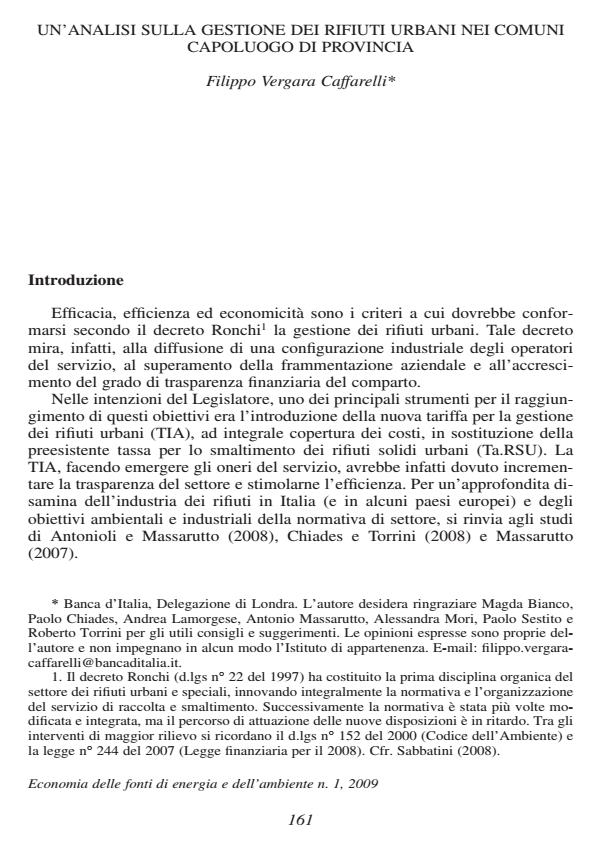Un'analisi sulla gestione dei rifiuti urbani nei comuni capoluogo di provincia
Journal title ECONOMIA DELLE FONTI DI ENERGIA E DELL’AMBIENTE
Author/s Filippo Vergara Caffarelli
Publishing Year 2009 Issue 2009/1
Language Italian Pages 20 P. 161-180 File size 626 KB
DOI 10.3280/EFE2009-001010
DOI is like a bar code for intellectual property: to have more infomation
click here
Below, you can see the article first page
If you want to buy this article in PDF format, you can do it, following the instructions to buy download credits

FrancoAngeli is member of Publishers International Linking Association, Inc (PILA), a not-for-profit association which run the CrossRef service enabling links to and from online scholarly content.
Waste Management in Italy: an Analysis of City-Level Data - Effectiveness, efficiency and affordability have been among the key criteria for municipal solid waste management in the Italian legal framework since the so-called "Ronchi Decree" of 1997. The paper analyses the economic performance of waste-collection firms in Italy. We construct a dataset that includes almost all the companies performing waste collection in the provincial capitals of Italy. We investigate their capital structure, profitability, value added, productivity, investment and business development by means of a set of financial ratios. The research is developed through the assessment of the effects on firms’ performance of specialisation, localisation, temporal evolution, size and legal form of firms and the remuneration system for waste collection. The aim of this paper is twofold. First, given the almost universal nature of the sample under investigation, we describe the economic and financial structure of waste collection firms in Italy; second, we empirically evaluate the extent to which the sector has taken on the industrial characteristics set forward in the legal framework. Hence the analysis is conducted both at sector level and at firm level. At the aggregate level, it is possible to identify a trend for the sector as a whole towards convergence with the rest of the economy. However, waste management still displays clear signs of backwardness, especially due to weaker financial structure, higher incidence of labour costs on value added and lower investment. Firm-level data are analysed with both univariate and multivariate statistical techniques. The results confirm the general backwardness of the sector, with businesses located in Southern part of Italy lagging even further behind. Moreover, firms simultaneously providing multiple utility services are more profitable than those specialized in the waste sector only. However this appears attributable to cross-subsidisation between services, not economies of scope. Both scale of operations and legal form have a positive impact on firms’ profitability, thanks in part to a negative correlation with degree of specialisation. Moreover, the economic performance of waste management firms is significantly pro-cyclical. Finally, the new cost-based remuneration system for collection services produces ambiguous results. It has a positive effect on operational efficiency and productivity but does not increase the return on capital. A simple econometric model is estimated to evaluate the simultaneous impact on firms’ performance of specialisation, localisation, temporal evolution, size, legal form and remuneration system, confirming the outcome of the univariate analysis. In the light of our results, the successful "industrialization" of the waste management sector appears still far away.
Keywords: local public services, waste management, regulation
JEL classifications: L32, L51, Q53
Parole chiave: servizi pubblici locali, gestione dei rifiuti urbani, regolamentazione
Filippo Vergara Caffarelli, Un'analisi sulla gestione dei rifiuti urbani nei comuni capoluogo di provincia in "ECONOMIA DELLE FONTI DI ENERGIA E DELL’AMBIENTE" 1/2009, pp 161-180, DOI: 10.3280/EFE2009-001010